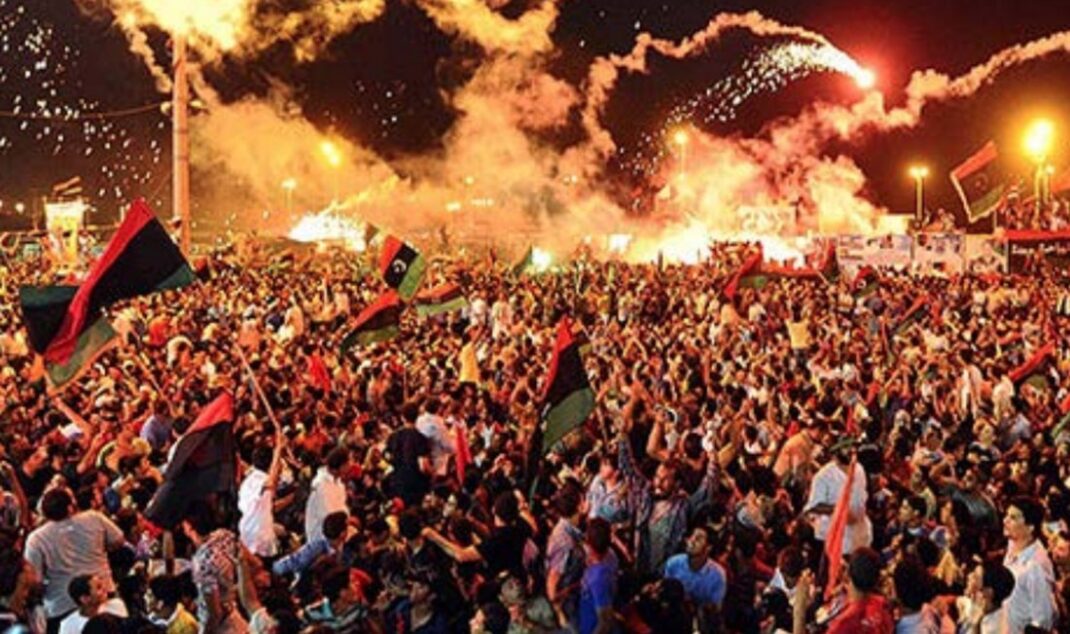Editors: Nadja Berghoff and Anas El-Gomati


A decade on from the February 17th revolution, how the global disorder transformed Libya into a battleground for interest, ideology and influence.
Chapter 4
Italy: In Pursuit of a new Role
By Mattia Giampaolo
 Italy has a long and complex history and relationship to Libya that predates the events of the past decade. Italy is conscious of this history, and on February 17th 2011 unlike it’s european neighbours in France and the United Kingdom expressed deep concerns regarding Libya’s future. This is largely as a result of the pre 2011 revival of ties between the two countries.
Italy has a long and complex history and relationship to Libya that predates the events of the past decade. Italy is conscious of this history, and on February 17th 2011 unlike it’s european neighbours in France and the United Kingdom expressed deep concerns regarding Libya’s future. This is largely as a result of the pre 2011 revival of ties between the two countries.
The 2008 Treaty on Friendship Partnership and Cooperation Italy and Libya 1 – also known as the Benghazi Treaty – signed between Libya’s former leader Mu‘ammar Gaddafi and former Italian Prime Minister Silvio Berlusconi, aimed to put an end to the long dispute regarding Italy’s colonial legacy in Libya and to open a new chapter of strategic cooperation.
Libya and Italy, by signing the treaty, intensified their bilateral relationship in terms of state investments and countering illegal migration from Libya to Italy’s shores. Italy, from its side, pledged to pay 5 billion euros of reparations to its former colony for 32 years of occupation, to be invested in basic infrastructures.
On the base of this treaty, Italy established itself as Libya’s strategic European partner, resulting in Italy gaining privileged access to Libya’s energy resources, and also being capable of stemming the migration wave which had begun to alarm Rome.
The Italian oil giant Eni, who had maintained a footprint in Libya throughout it’s estrangement from the West, played a quiet but key role behind the scenes in engineering the deal behind the treaty.
By 2010, a year before the revolution Libya became Italy’s largest oil supplier and third largest gas supplier, accounting for almost 80% of bilateral trade between the two countries.
The 2011 NATO operation not only brought an end to the Gaddafi regime, but an end to the five year long reconciliation process, and Italy’s privileged economic partnership with Libya.
Its initial neutral position on NATO operations well underway in July 2011 demonstrated how strong the ties were between the two countries, and the risks to Italy.
Moreover, the proactive foreign policy of France, the UK and the USA preceding and following NATO’s Operation Unified Protector led to these countries leapfrogging Italy in it’s diplomatic relations with the political body that replaced the Gaddafi regime, the National Transitional Council.
Despite UN endorsement, and EU backing the NATO operation would later become divided over muliteral policies and policy priority. In the aftermath of the foreign intervention in Libya, Italy and France, entered into a long and excruciating diplomatic crisis over their conflicting policies towards Libya that would ultimately divide Europe, and negatively affect the union’s role as a unified diplomatic actor during the April 2019 civil war.
This intra European rift with France has served to diminish Italy’s prominence, it’s mediation role and diplomatic capabilities in Libya.
Italy’s foreign policy in Libya
Italy’s support to the UN brokered Skhirat agreement, which aimed to construct a unity government in the ashes of Libya’s 2014 civil war and guide the country to future democratic elections, is not only rooted in Italy’s diplomatic regard for UN, but also reflects the safeguarding of its own strategic interests in Libya (energy and migration).
In the aftermath of the Gaddafi regime, Italy’s foreign policy has continued to be shaped by legacy issues such as energy security, and migration policy.
In the years since, Italian diplomacy has worked hard to build relationships with Libyan political figures, particularly in Tripolitania, Western Libya in order to facilitate these policies.
In terms of energy, the whole Tripoli province is strategic for gas and oil export. The city of Mellitah, represents the most important pole for oil and gas export.
All the gas produced in Wafa and the offshore field –Bahr Assalam- passes through the Mellitah pipeline and reaches Italy (Gela, Sicily) through the Greenstream Pipeline.
These relationships in western Libya would be a key determinant of Italy’s foreign policy after Libya became divided between east and west following the 2014 civil war, and the UN led political process to resolve its policy engagement to Libya.
Following the establishment of the Government of National Accord (GNA) in 2015, Italy tried to promote, by backing the UN road map, a unifying process in order to have a stable partner to talk with. However, Italy’s foreign policy has also been influenced by domestic affairs, the inability to forge consensus and the resulting weakness of Italian governments since 2014.
The migration ‘crisis’ has played a crucial role for the stability of the Italian politics. The weakness of the Italian governments from 2014-2018 and 2018-2019 and the increasing spread of anti-migration sentiment led Italy to have a shifting role within the Libyan crisis.
Between 2014-18, despite Italy’s center-leftist line under both Renzi and Gentiloni administrations, the government began to shape its foreign policy agenda around the issues of security and migration.
The so-called ‘migrant’s emergency’ in Italy became a national security issue, resulting in the government giving the Ministry of Interior the metaphorical keys to manage the crisis at the expense of the Ministry of Foreign Affairs Minister.
This had severe consequences for Italy that negatively impacted the Italian role in Libya, provoking Italy to take on short-term and short sighted policies which, in some respects, jeopardised Libya’s stability.
In order to halt illegal migration, Italy and the GNA signed in 2017 the Memorandum of understanding on cooperation in the development sector, to combat illegal migration, human trafficking and contraband and on reinforcing border security.
The document contained an eight points agreement that aimed to manage illegal migration and reinforce the instruments (Libyan Coastal Guards and border security) for the surveillance of the Libyan shores and the terrestrial borders.
The scope of the memorandum was not only to manage illegal migration, but aimed to reinforce the GNA’s territorial and border control, especially in the South of Libya wherein the government control was poor in terms of security and migration trafficking.
However, considering the fragmentation and institutional weakness of the GNA and the deteriorating conditions on the ground, the Libyan coast guard and the police border were not able to handle the problem on their own.
This brought the Interior Minister to contract –quasi informally- with informal armed groups, smugglers in the north and city mayors of the Libyan south to stop migrant flows.
In this way, Italian foreign policy became increasingly incoherent; the continuous stress on promoting a unitary institutional path for Libya was followed with the MoU and an contradictory approach that ultimately legitimized the power of armed groups and local tribes.
This strategy, predictably did not pay off in the end for both sides. On the one side, Italy was able to stem the migration flow toward its own shores, yet on the other side, the GNA’s formal authorities, began to face direct consequences linked to the deal.
The gradual loss of Italy’s influence in Libya further increased in May 2018 following Italy’s parliamentary elections. The new elected government did not change its foreign policy on Libya; Indeed, the increasing division between the Interior Ministry and the Foreign Affairs Ministry shaped, even more, their controverse decision making process.
In addition the new government of the Lega Nord (North League, nationalist movement), a right wing populist government intensified its relationship with US ex-president Donald Trump, with whom they shared ideational synergies, and with whom Trump regarded as potential allies in Europe, and a key player in Libya.
During a visit to Washington three months earlier, on 30 July 2018, Italy’s President Conte obtained President Donald Trump’s endorsement to establish an Italian “control room”, as the Italian leader defined it, that would make Italy the United States’ primary interlocutor in Europe for “Mediterranean challenges” such as terrorism and, particularly, the Libyan crisis.
The US support for the Italian government pushed Italy to organize the Palermo conference in November 2018 with the aim of reinforcing the intra-Libyan political dialogue, putting an end to the conflict and replacing its European competitor France in taking a new leading role on Libya.
However, as demonstrated by the poor results of the Palermo conference, Italy, once again demonstrated a lack of coherent strategy in Libya and rather got into a dispute with France over the diplomatic way forward for Libya.
Indeed, the new prime minister and former Minister of Interior, Matteo Salvini, adopted a strong anti-migrant rhetoric and started a diplomatic war with France, accusing it of having destabilized Libya and having triggered a migration wave to Italy.
This French-Italian skirmish not only influenced Italy’s diplomatic approach to Libya’s conflict, but also the quick organization of the Palermo Conference in November 2018.
The conference was mostly a response to the Paris conference that convened Haftar and Serrak organized by the Elyseees in late May 2019.
Italy’s new leadership demonstrated during that conference its lack of a coherent strategy in dealing with the Libyan internal political disputes and, moreover, with competing European powers and the foreign policy of France.
The conference, congratulated by the Lega Nord as a success, failed to elicit any strategic result for Italy or the diplomatic process; on the contrary it provoked further diplomatic turmoil and outrage from important regional actors.
Turkey’s vice president who attended the conference was requested to leave by Khalifa Haftar, and was excluded from aspects of the meeting leading to his withdrawal from the Palermo conference.
Behind the failure of the conference, was a reshaping of Italian foreign policy towards Libya and its increasing legitimization of Khalifa Haftar. Italy, as outlined, was a crucial supporter of the Skhirat Agreement that produced the GNA in 2015.
Italy’s departure from an exclusive relationship to the GNA to building a relationship with Haftar in Palermo in 2018 demonstrated Italy’s ambition to carve out a space in France’s soft power territory in Libya.
The role of France has concerned Rome since the NATO intervention in 2011, but it’s relationship to Haftar since 2016 has provoked a sense of urgency and competition.
The presence of Italy’s neighbor in Libya means potentially jeopardizing Italian strategic interests, in particular it’s energy security.
The timing of this reshaping in Italy’s foreign policy led to an incoherent strategy following Haftar’s attack on Tripoli in April 2019, and exemplifies the paralysis of Italian foreign policy engagement in Libya.
In that moment, Italy simply remained on the sideline, waiting for the battle to produce a winner. A clear example was the Italian silence when Haftar bombed an area only 400 meters away from the Italian military hospital in Misrata.
Instead of expressing concern and condemnation of the attack, Italy remained silent and released no statement. President Conte at the time reacted to Haftar’s assault claiming: ‘Italy is neither with Haftar nor with al-Sarraj, we are with the Libyan people’.
Nevertheless, Italy’s attitude towards Libya changed once more through two important events: the Turkish intervention in Libya and the Berlin conference.
The signing of the MoU between Turkey and al-Sarraj in November 2019, on maritime border issues triggered the rage of some European countries, amongst them Italy, since the agreement was a direct attack on Italy’s energy interests in the East Mediterranean.
This event resulted in Italy acting more as a European player and putting aside internal rivalries with France to work within a European Union framework.
This change of heart has been facilitated by the Italian government’s re-shuffling in 2019 which excluded the far-right movement from the executive and included pro-European forces) within the government coalition.
In the midst of Haftar’s attack on Tripoli and Turkey’s growing presence in Western Libya, Italy’s reinvigorated and multilateral approach has gained more ground in particular during the Berlin conference in January 2020.
Italy seemed to put aside its own unilateral interests by promoting a central role for Europe as a ‘neutral’ actor in the Libyan political peace process.
Conclusion
With the fall of the Gaddafi regime in 2011, Italy has had to return to the drawing board and reshape its role. Thus far, it has been unable to foster strategic relationships with the key political actors who matter on the ground, and return them to the strength they had been prior to the revolution a decade ago.
The weakness of subsequent Italian governments and the constant pressure and pursuit of short-term objectives over a long-term strategy has led to a series of incoherent policies.
The transformation of the conflict in 2019 into a global civil war has both negatively influenced Italy and Europe’s role in the country.
In this new phase of the conflict, Italy seems to be more integrated within a European mechanism. Crucial issues regarding Libya, namely energy and migration, seem to be arriving in Brussels rather than Rome.
The same approach is being applied by Italy towards the Berlin process and the UN brokered political dialogue and unification process.
Italy has supported all of the UN brokered initiatives taken in Bouznika and Tunis and sees the involvement of Libya’s neighbor countries as a positive move on the part of the international community.
In addition, the latest visit of GNA Prime Minister al-Sarraj in Rome and of the Italian External Security Services (AISE) in Benghazi represent the return of Italy to Libya.
Yet this return could also be jeopardized by a new internal political crisis within the Italian government that could threaten to short circuit it’s new foreign policy before it takes off.
If there will be a radical domestic change in the Italian government coalition, Italy should first rebuild its credibility and forge new alliances in order to establish a stable long term strategy, but perhaps Libya’s next government cannot wait for Rome to find it’s rhythm.
***
Mattia Giampaolo is a Research Fellow at CeSPI (Centro Studi di Politica Internazionale) in Rome and Pan-European Fellow at ECFR (European Council on Foreign Relations). He conducts research on political movements and parties in Egypt and Tunisia at CeSPI and he focuses, at ECFR, on Libya-Italy relations. He is now working on the Egyptian State-society relations in the aftermath of the 2011 Revolution. His last publications include: La Libia in Marocco: La fretta è del diavolo (Libya in Morocco: The hurry is from the devil, CeSPI 2020); Libia: la fine di Haftar? (Libya: the end of Haftar?, CeSPI 2020); How Italy has been marginalized in Libya (ECFR, 2020); General Haftar and the Risks of Authoritarian “Stability” in Libya (IAI,
2020).
Nadja Berghoff – Programs and Communication Fellow at Sadeq Institute.
Anas El-Gomati – Director, Libya’s 1st think tank. Chief contributor Security & Governance.
____________





